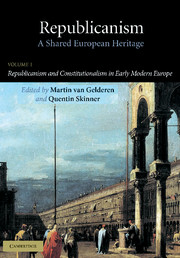Book contents
- Frontmatter
- Contents of Volume I
- Contents of Volume II
- Acknowledgments
- Introduction
- Part I The Rejection of Monarchy
- 1 ‘That a Republic is Better than a Monarchy’: Anti-monarchism in Early Modern Dutch Political Thought
- 2 Anti-monarchism in English Republicanism
- 3 Anti-monarchism in Polish Republicanism in the Seventeenth and Eighteenth Centuries
- 4 Classical Republicanism in Seventeenth-century England and the Netherlands
- Part II The Republican Citizen
- Part III The Republican Constitution
- Bibliography
- Contributors
- Index of Names of Persons
- Index of Subjects
1 - ‘That a Republic is Better than a Monarchy’: Anti-monarchism in Early Modern Dutch Political Thought
Published online by Cambridge University Press: 15 December 2009
- Frontmatter
- Contents of Volume I
- Contents of Volume II
- Acknowledgments
- Introduction
- Part I The Rejection of Monarchy
- 1 ‘That a Republic is Better than a Monarchy’: Anti-monarchism in Early Modern Dutch Political Thought
- 2 Anti-monarchism in English Republicanism
- 3 Anti-monarchism in Polish Republicanism in the Seventeenth and Eighteenth Centuries
- 4 Classical Republicanism in Seventeenth-century England and the Netherlands
- Part II The Republican Citizen
- Part III The Republican Constitution
- Bibliography
- Contributors
- Index of Names of Persons
- Index of Subjects
Summary
Historical scholarship has not been very generous in its treatment of seventeenth- and eighteenth-century Dutch republicanism. Whereas it is hard to keep track of the continuous stream of studies devoted to early modern Italian or English republicanism, publications on the political thought of the Dutch Republic have remained few and far between. Indeed, although the situation has somewhat improved in recent years, it may still be stated without exaggeration that large areas of early modern Dutch political thought remain entirely unexplored. There are, leaving aside the remarkable fact that the history of political thought has never been a prominent field of study in Dutch academia, at least two reasons for this rather unsatisfactory state of affairs.
First of all, there is the deep-seated conviction that the Dutch have always been a thoroughly practical, pragmatic, and commonsensical people, not much inclined to theory. Thus, in a recent overview of early modern Dutch republicanism, Herbert Rowen once again ends with the time-worn cliché that Dutch political theory did not match Dutch political practice. ‘Can it be’, his concluding rhetorical question goes, ‘that those who possess liberty – as the Dutch did in these two centuries more than any other people in Europe – are not driven to philosophize about it?’ (Rowen 1994: 340). Quite an amazing verdict, one cannot help thinking, on a culture that produced not only Grotius and Spinoza, but also an astonishingly rich political pamphlet literature – see for instance Knuttel 1889–1920.
- Type
- Chapter
- Information
- RepublicanismA Shared European Heritage, pp. 9 - 26Publisher: Cambridge University PressPrint publication year: 2002
- 7
- Cited by



